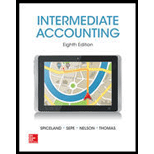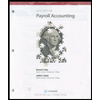
Intermediate Accounting w/ Annual Report; Connect Access Card
8th Edition
ISBN: 9781259546860
Author: J. David Spiceland
Publisher: McGraw-Hill Education
expand_more
expand_more
format_list_bulleted
Concept explainers
Question
Chapter 17, Problem 17.3Q
To determine
Pension plan: This is the plan devised by corporations to pay the employees an income after their retirement, in the form of pension.
Types of pension plans:
- Defined contribution pension plans: In such plans, employers contribute fixed amounts annually, to the pension fund. The benefit amounts are based on size of pension fund available at the time of retirement. There is no commitment on the part of the employers to pay fixed retirement benefits.
- Defined benefit pension plans: In such plans, employers pay annual fixed contributions to employees as retirement benefits. Employers promise to pay fixed retirement benefits, which are computed based on the service period of employee, annual compensation of the employee, and age.
To indicate: The type of pension plan established by Corporation L
Expert Solution & Answer
Want to see the full answer?
Check out a sample textbook solution
Students have asked these similar questions
Can you solve this financial accounting question with the appropriate financial analysis techniques?
Julius provided consulting services amounting to P420, 000. His total expenses were 25%. His net income is: A. P105,000 B. P300,000 C. P315,000 D. P120,000
What is the cost of goods sold
Chapter 17 Solutions
Intermediate Accounting w/ Annual Report; Connect Access Card
Ch. 17 - Prob. 17.1QCh. 17 - Prob. 17.2QCh. 17 - Prob. 17.3QCh. 17 - What is the vested benefit obligation?Ch. 17 - Prob. 17.5QCh. 17 - Prob. 17.6QCh. 17 - Name three events that might change the balance of...Ch. 17 - Prob. 17.8QCh. 17 - Prob. 17.9QCh. 17 - Prob. 17.10Q
Ch. 17 - The return on plan assets is the increase in plan...Ch. 17 - Define prior service cost. How is it reported in...Ch. 17 - Prob. 17.13QCh. 17 - Is a companys PBO reported in the balance sheet?...Ch. 17 - What two components of pension expense may be...Ch. 17 - Prob. 17.16QCh. 17 - Evaluate this statement: The excess of the actual...Ch. 17 - Prob. 17.18QCh. 17 - TFC Inc. revises its estimate of future salary...Ch. 17 - Prob. 17.20QCh. 17 - Prob. 17.21QCh. 17 - Prob. 17.22QCh. 17 - The components of postretirement benefit expense...Ch. 17 - Prob. 17.24QCh. 17 - Prob. 17.25QCh. 17 - Prob. 17.26QCh. 17 - Prob. 17.1BECh. 17 - Prob. 17.2BECh. 17 - Prob. 17.3BECh. 17 - Prob. 17.4BECh. 17 - Prob. 17.5BECh. 17 - Prob. 17.6BECh. 17 - Prob. 17.7BECh. 17 - Prob. 17.8BECh. 17 - Prob. 17.9BECh. 17 - Prob. 17.10BECh. 17 - Net gain LO176 The projected benefit obligation...Ch. 17 - Prob. 17.12BECh. 17 - Prob. 17.13BECh. 17 - Prob. 17.14BECh. 17 - Prob. 17.15BECh. 17 - Prob. 17.1ECh. 17 - Prob. 17.2ECh. 17 - Prob. 17.3ECh. 17 - Prob. 17.4ECh. 17 - Prob. 17.5ECh. 17 - Prob. 17.6ECh. 17 - Prob. 17.7ECh. 17 - Prob. 17.8ECh. 17 - Prob. 17.9ECh. 17 - Prob. 17.10ECh. 17 - Prob. 17.11ECh. 17 - Prob. 17.12ECh. 17 - Prob. 17.13ECh. 17 - Prob. 17.14ECh. 17 - Prob. 17.15ECh. 17 - Prob. 17.16ECh. 17 - Prob. 17.17ECh. 17 - Prob. 17.18ECh. 17 - Prob. 17.19ECh. 17 - Prob. 17.20ECh. 17 - Prob. 17.21ECh. 17 - Prob. 17.22ECh. 17 - Prob. 17.23ECh. 17 - Prob. 17.24ECh. 17 - Prob. 17.25ECh. 17 - Prob. 17.26ECh. 17 - Prob. 17.27ECh. 17 - Prob. 17.28ECh. 17 - Prob. 17.29ECh. 17 - Prob. 17.30ECh. 17 - Prob. 17.31ECh. 17 - Prob. 17.32ECh. 17 - Prob. 17.33ECh. 17 - Prob. 1CPACh. 17 - Prob. 2CPACh. 17 - Prob. 3CPACh. 17 - Prob. 4CPACh. 17 - Prob. 5CPACh. 17 - Prob. 6CPACh. 17 - Prob. 7CPACh. 17 - Prob. 8CPACh. 17 - Prob. 1CMACh. 17 - Prob. 2CMACh. 17 - Prob. 17.1PCh. 17 - Prob. 17.2PCh. 17 - Prob. 17.3PCh. 17 - Prob. 17.4PCh. 17 - Prob. 17.5PCh. 17 - Prob. 17.6PCh. 17 - Prob. 17.7PCh. 17 - Prob. 17.8PCh. 17 - Prob. 17.9PCh. 17 - Prob. 17.10PCh. 17 - Prob. 17.11PCh. 17 - Prob. 17.12PCh. 17 - Prob. 17.13PCh. 17 - Prob. 17.14PCh. 17 - Prob. 17.15PCh. 17 - Prob. 17.16PCh. 17 - Prob. 17.17PCh. 17 - Prob. 17.18PCh. 17 - Prob. 17.19PCh. 17 - Prob. 17.20PCh. 17 - Prob. 17.21PCh. 17 - Prob. 17.1BYPCh. 17 - Prob. 17.2BYPCh. 17 - Prob. 17.3BYPCh. 17 - Prob. 17.5BYPCh. 17 - Prob. 17.6BYPCh. 17 - Prob. 17.8BYPCh. 17 - Prob. 17.9BYPCh. 17 - Prob. 17.10BYPCh. 17 - Prob. 17.12BYPCh. 17 - Prob. 1AFKC
Knowledge Booster
Learn more about
Need a deep-dive on the concept behind this application? Look no further. Learn more about this topic, accounting and related others by exploring similar questions and additional content below.Similar questions
- SnapGallery Inc. sells one digital poster frame. The sales price per unit is $12. The variable cost per unit is $7. Fixed costs per annum are $13,500 and having a sales volume of 5,000 digital poster frames would result in: 1. a profit of $11,500 2. a loss of $2,500 3. breaking even 4. a profit of $8,000arrow_forwardWhat would be the bas debt expense for the yeararrow_forwardHow much overhead was applied during the year?arrow_forward
- Calculate the predetermined overhead rate per machine hourarrow_forwardOn June 1, SunDial Corporation's board of directors declares common stock dividends totaling $35,000. The dividends are payable on December 31 to shareholders of record on September 1. What entry will SunDial make on June 1?arrow_forwardWhat is the net income?arrow_forward
- Brightway Corp. purchased land, a building, and equipment for one price of $900,000. The estimated fair values of the land, building, and equipment are $150,000, $600,000, and $250,000, respectively. At what amount would the company record the land?arrow_forwardCan you explain the correct approach to solve this financial accounting question?arrow_forwardPlease explain the correct approach for solving this financial accounting question.arrow_forward
- Isabella Traders reported owner’s equity of $84,000 at the beginning of the year and $143,000 at the end of the year. The owner made no additional investments and withdrew $41,000 during the year. The net income for the year amounted to: A) $100,000 B) $96,000 C) $88,000 D) $86,000arrow_forwardHelp me tutorarrow_forwardWhat will be the balance in the patent account on June 30, 2019?arrow_forward
arrow_back_ios
SEE MORE QUESTIONS
arrow_forward_ios
Recommended textbooks for you
 Intermediate Accounting: Reporting And AnalysisAccountingISBN:9781337788281Author:James M. Wahlen, Jefferson P. Jones, Donald PagachPublisher:Cengage Learning
Intermediate Accounting: Reporting And AnalysisAccountingISBN:9781337788281Author:James M. Wahlen, Jefferson P. Jones, Donald PagachPublisher:Cengage Learning
 Pfin (with Mindtap, 1 Term Printed Access Card) (...FinanceISBN:9780357033609Author:Randall Billingsley, Lawrence J. Gitman, Michael D. JoehnkPublisher:Cengage Learning
Pfin (with Mindtap, 1 Term Printed Access Card) (...FinanceISBN:9780357033609Author:Randall Billingsley, Lawrence J. Gitman, Michael D. JoehnkPublisher:Cengage Learning

Intermediate Accounting: Reporting And Analysis
Accounting
ISBN:9781337788281
Author:James M. Wahlen, Jefferson P. Jones, Donald Pagach
Publisher:Cengage Learning





Pfin (with Mindtap, 1 Term Printed Access Card) (...
Finance
ISBN:9780357033609
Author:Randall Billingsley, Lawrence J. Gitman, Michael D. Joehnk
Publisher:Cengage Learning